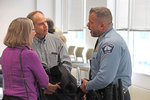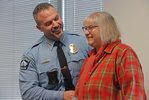



“In order to have a change, we need a change agent,” stated Ward 7 Council Member Lisa Goodman during a Lunch with Lisa event on Feb. 1, 2023.
She admitted to having some trepidation about hiring an outsider as police chief, and said she let Brian O’Hara know that when she met with him.
“We need someone who really understands us,” Goodman told the people having lunch at the University of St. Thomas downtown Minneapolis campus. “You know what I found out? Brian O’Hara does. I have been overwhelmed by the work so far. This is the person to lead us through that effort.”
“With the issues we’re facing, we don’t have time for nonsense. We need to get to the point,” stated O’Hara, who was sworn in on Nov. 7, 2022. O’Hara explained that he worked on police reform in Newark, N.J., operating for five years under a federal consent degree. Currently, there are two investigations going on in Minneapolis – one by the State Department of Human Rights and the other by the U.S. Department of Justice – and he expects a number of mandates for reforms to be issued.
“We need to be able to bring the police officers along voluntarily and support them, and show them there are ways to do this job a different way,” remarked O’Hara.
“The mission of our agency is very simple. We need to do everything that we can to have fewer victims of crime and violence, and at the same time do so in ways that build trust in community.”
He said that officers need to operate in ways that demonstrate the values the community wants to see.
O’Hara said their greatest priority is to address the “unacceptable amount” of gun violence in the city. He pointed out that the trajectory of gun violence is declining, specifically in the second half of last year. “We actually ended the year with over 100 fewer shooting victims,” he stated. “That’s 100 fewer families that were affected by gun violence in the city. But it’s still at an absolutely unacceptable level.”
By working with as many partners as possible, O’Hara said they’re working to be precise in their efforts. He pointed out that the Police Activities League has been reestablished, and they’re trying to attract more young people from the city to be police officers.
“It’s incredible difficult to become a police officer in this state as compared to other states,” observed O’Hara. A Harvard graduate couldn’t be hired as an officer here without going through the peace officer training at a local college and then going through the specific training for the city of Minneapolis. This makes it harder for older workers to switch careers or single parents, he said. The Minnesota system of peace officer licensing is unique in the nation because it requires peace officers to obtain a two or four-year post-secondary degree, and there is no state-sponsored police training academy. After earning the degree, officers then take the POST Board’s Peace Officer Licensing Examination to become eligible to be hired as a peace officer. After that, they receive specific training from the city they are hired at. The Minneapolis Police Academy training course is 14 to 16 weeks.
“We’re trying to enact some legislation to change that,” said O’Hara.
They’re also working to attract more officers from other states, although he said that will require more money.
O’Hara observed that Minneapolis officers bid on shifts in different ways than he is used to, and that results in them working under differing supervisors and with varying team members. It is not the traditional model of working with one group of officers. “You can’t get to know your fellow officers as well,” he said. It affects the unity of command as well as accountability. “Each person should answer to one particular person and know them well,” said O’Hara.
He changed the policy on how people can make a complaint on an officer to make it easier. “If someone is saying a Minneapolis Police Officer is doing something wrong, we need to write it down and look into it,” said O’Hara.
COMMUNITY ENGAGEMENT A PRIORITY
O’Hara pointed out that the level of serious crime is higher than it has been in a generation. “But we cannot allow the police department and our officers to only do law enforcement issues. It’s incredibly important to have engagement.”
A pilot program began in February in the Third Precinct to hold a monthly community meeting with command staff as they review crime and brainstorm strategies.
O’Hara said that morale in the police department is an issue that has been brought up. “We try to do some simple things to reward officers and build motivation and appreciation,” he stated. He wants the focus to be on rewarding good behavior while at the same time putting strong processes in place to hold officers accountable when their behavior is not what the community expects.
In New Jersey, they shared photos and body camera video of officers doing non-enforcement work in the community, such as an officer who helped shovel a driveway when a resident couldn’t get out. Unfortunately, he pointed out that Minnesota state laws only allow for the sharing of body camera footage for the “most terrible things.”
He said, “Engagement and trust building is just as important as reducing the number of victims.”
Comments
No comments on this item Please log in to comment by clicking here